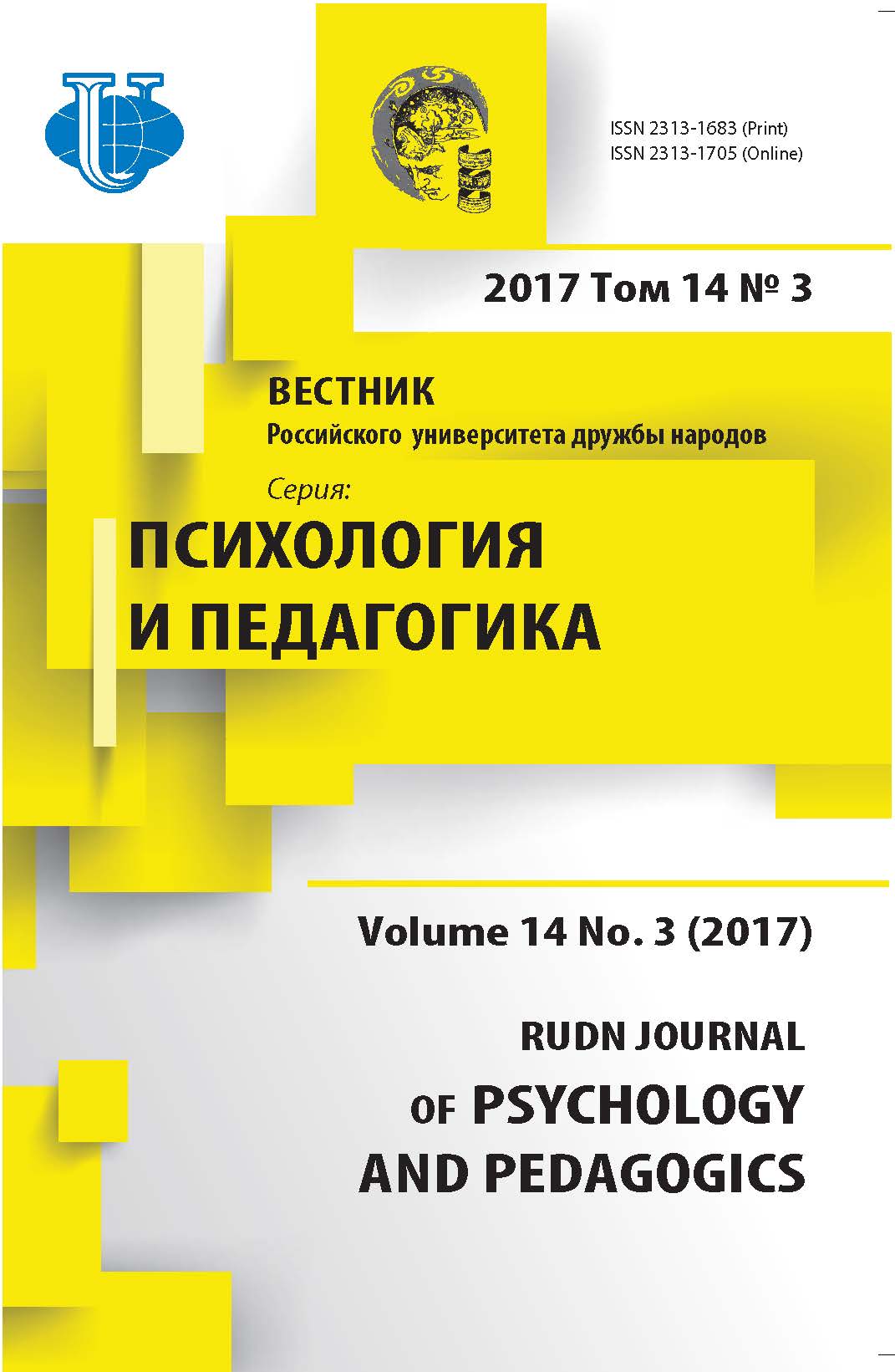LIFE VALUES OF PERSONS IN CROSS-CULTURAL (ARAB - RUSSIAN) AND MONOCULTURAL MARRIAGES AND THEIR REPRESENTATION IN FAMILY SPHERE
- Authors: Chebotareva E.Y1,2,3, Jaber H.M.1
-
Affiliations:
- Peoples’ Friendship University of Russia (RUDN University)
- Moscow State University of Psychology and Education
- National Research University “Higher School of Economics”
- Issue: Vol 14, No 3 (2017)
- Pages: 311-325
- Section: Articles
- URL: https://journal-vniispk.ru/2313-1683/article/view/347537
- DOI: https://doi.org/10.22363/2313-1683-2017-14-3-311-325
- ID: 347537
Cite item
Full Text
Abstract
About the authors
Elena Y Chebotareva
Peoples’ Friendship University of Russia (RUDN University); Moscow State University of Psychology and Education; National Research University “Higher School of Economics”
Email: chebotareva_eyu@rudn.university
PhD, Associate professor. Associate professor of: the Department of Social and Differential Psychology of Peoples’ Friendship University of Russia (RUDN University); the Department of Child and Family Psychotherapy of Moscow State University of Psychology and Education; Master program “Systemic family psychotherapy” of National Research University “Higher School of Economics” Miklukho-Maklaya str., 6, Moscow, Russia, 117198; Sretenka str., 29, Moscow, Russia, 127051; Myasnitskaya str., 20, Moscow, Russia,101000
Hasan MA Jaber
Peoples’ Friendship University of Russia (RUDN University)
Email: alone5544332211@mail.ru
Post graduate student of the Department of Social and Differential Psychology of Peoples’ Friendship University of Russia (RUDN University) Miklukho-Maklaya str., 6, Moscow, Russia, 117198
References
- Call, V.R.A. & Heaton, T.B. (1997). Religious influence on marital stability. Journal for the Scientific Study of Religion, 36(3), 382-392. doi: 10.2307/1387856.
- Chebotareva, E. (2014). Psychological factors of ethnic extremism in Muslim youth. Mediterranean Journal of Social Sciences, 5 (22), 140-148. doi: 10.5901/mjss.2014.v5n22p140.
- Chebotareva, E. (2015). Cultural Specifics of Life Values and Subjective Well-Being. Mediterranean Journal of Social Sciences, 6 (2 S5), 301-307. doi: 10.5901/mjss.2015.v6n2s5p301.
- Chebotareva, E.Yu. (2016). Tsennostnye orientatsii i ustanovki k semeinoi zhizni v dobrachnyi period: gendernyi aspect. Problemnoe pole sovremennoi sem’i. Moscow: MGGU im. Sholokhova, 208-213. (In Russ.).
- Cooney, T. & Radina, M. (2000). Adjustment problems in adolescence: Are multiracial children at risk? American Journal of Orthopsychiatry, 70 (4), 433-444. doi: 10.1037/h0087744.
- Curtis, K.T., & Ellison, C.G. (2002). Religious heterogamy and marital conflict: Findings from the national survey of families and households. Journal of Family Issues, 23(4), 551-576. doi: 10.1177/0192513x02023004005.
- Fischer R. & Schwartz S. (2011). Whence differences in value priorities? Individual, cultural, or artifactual sources. Journal of Cross-Cultural Psychology, 42 (7), 1127-1144. doi: 10.1177/0022022110381429.
- Gaines, S. & Brennan, K. (2001). Establishing and maintaining satisfaction in multicultural relationships. In J. Harvey & A. Wenzel (Eds.). Close Romantic Relationships: Maintenance and Enhancement (pp. 237-253). Mahwah, NJ: Lawrence Erlbaum Associates, Inc.
- Gaines, S. & Agnew, C. (2003). Relationship maintenance in inter-cultural couples: An interdependence analysis. In D. Canary & M. Dainton (Eds.). Maintaining Relationships Through Communication (pp. 231-253). Mahwah, NJ: Lawrence Erlbaum Associates, Inc.
- Heaton, T.B., & Pratt, E.L. (1990). The effects of religious homogamy on marital satisfaction and stability. Journal of Family Issues, 11(2), 91-207. doi: 10.1177/019251390011002005.
- Heaton, T.B. (2002). Factors contributing to increasing marital stability in the United States. Journal of Family Issues, 23(3), 392-409. doi: 10.1177/0192513x02023003004.
- Kelley, H. & Thibaut, J. (1978). Interpersonal relations: A theory of interdependence. New York: Wiley.
- Killian, K. (2001). Crossing borders: Race, gender, and their intersections in inter-racial couples. Journal of Feminist Family Therapy, 13, 1-31.
- Killian, K. (2002). Dominant and marginalized discourses in inter-racial couples’ narratives: Implications for family therapists. Family Process, 41(4), 603-618. doi: 10.1111/j.1545-5300.2002.00603.x.
- Mahoney, A., Pargament, K.I., Tarakeshwar, N., & Swank, A.B. (2008). Religion in the home in the 1980s and 1990s: A meta-analytic review and conceptual analysis of links between religion, marriage, and parenting. Psychology of Religion and Spirituality, S(1), 63-101. doi: 10.1037/1941-1022.s.1.63.
- Mahoney, A. (2010). Religion in families, 1999-2009: A relational spirituality framework. Journal of Marriage and Family, 72(4), 805-827. doi: 10.1111/j.1741-3737.2010.00732.x.
- Maslova, O.V. & Bui, D.T. (2015) Izmenenie tsennostnykh orientatsii v’etnamskikh studentov v Rossii: rezul’taty empiricheskogo issledovaniya. Vestnik Kemerovskogo gosudarstvennogo universiteta, (3), 179-184. (In Russ.).
- McClendon, D. (2016) Religion, Marriage Markets, and Assortative Mating in the United States. Journal of Marriage and Family, 78 (5), 1399-1421. doi: 10.1111/jomf.12353.
- Model, S. & Fisher, G. (2002). Unions between Blacks and Whites: England and the US compared. Ethnic and Racial Studies, 25(5), 728-754. doi: 10.1080/0141987022000000240.
- Myers, S.M. (2006). Religious homogamy and marital quality: Historical and generational patterns, 1980-1997. Journal of Marriage and Family, 68(2), 292-304. doi: 10.1111/j.1741-3737.2006.00253.x.
- Ortega, S.T., Whitt, H.P. & William, J.A. (1988). Religious homogamy and marital happiness. Journal of Family Issues, 9(2), 224-239. doi: 10.1177/019251388009002005.
- Perry, S.L. (2015). A Match Made in Heaven? Religion-Based Marriage Decisions, Marital Quality, and the Moderating Effects of Spouse’s Religious Commitment. Social Indicators Research, 123 (1), 203-225. doi: 10.1007/s11205-014-0730-7.
- Perry, S.L (2016). Spouse’s Religious Commitment and Marital Quality: Clarifying the Role of Gender. Social Science Quarterly, 97 (2), 476-490. doi: 10.1111/ssqu.12224.
- Petts, R.J. (2016) Religious homogamy, race/ethnicity, and parents’ relationship stability. Sociological Focus, 49 (3), 163-179. doi: 10.1080/00380237.2016.1135027.
- Sokolovskii, S.V. (2003). Podkhody k izucheniyu etnicheskoi identifikatsii. SOTsIS, (3), 23-28. (In Russ.).
- Stringer, H. (1991). A comparison of selected marital characteristics in black-white interracial marriages and same race marriages. Unpublished doctoral dissertation, The Ohio State University, Columbus, OH.
- Schwartz S.H. (2009). Culture matters: National value cultures, sources and consequences. In C.-Y. Chiu, Y.Y. Hong, S. Shavitt, & R.S. Wyer (Eds). Understanding culture: Theory, research and application (pp. 127-150). N.Y.: Psychology Press.
- Troy, A., Lewis-Smith, J., & Laurenceau, J. (2006). Interracial and intraracial romantic relationships: The search for differences in satisfaction, conflict, and attachment style. Journal of Social and Personal Relationships, 23(1), 65-80. doi: 10.1177/0265407506060178.
- Zhenchao Q., Sampson L.B. & Stacey D.R. (2001) Asian American Interracial and Interethnic Marriages: Differences by Education and Nativity. The International Migration Review, 35 (2), pp. 557-586. doi: 10.1111/j.1747-7379.2001.tb00029.x.
- Wood, J. (2000). Relational communication: Continuity and change in personal relationships (2nd ed.). Belmont, CA: Wadsworth.
Supplementary files








